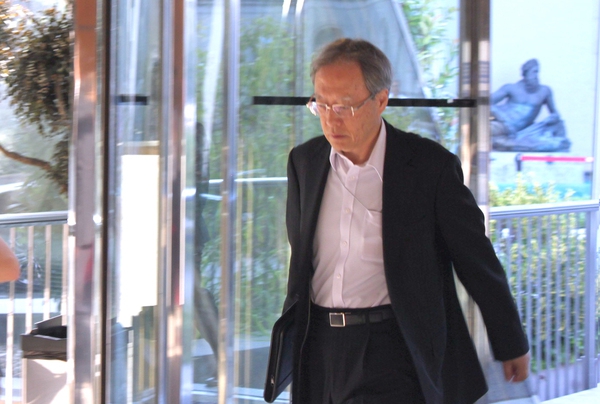 |
|
Junichi Ihara, a member of the Japanese delegation to the World Trade Organization (WTO) General Council in Geneva, Switzerland, before the meeting on July 24. (Yonhap News)
|
Abe administration continues to shift its narrative in retaliatory trade measures
On July 24, a Japanese delegate to the General Council of the World Trade Organization (WTO), held in Geneva, Switzerland, claimed that the South Korea is misrepresenting Japan’s rationale for its tougher export controls on Korea, which Japan claims are part of a security-based reassessment of how South Korea manages exports. The meeting was the scene of a row between South Korea and Japan over the export controls. “We emphasized during the general council that this measure is completely unrelated to the issue of forced laborers; that, in fact, it’s not even an export control,” said Junichi Ihara, Japanese ambassador to Geneva and a member of Japan’s delegation to the council, during a press conference held afterward. Ihara was rebutting South Korea’s argument that Japan’s export controls are connected to a ruling by the South Korean Supreme Court ordering the victims of forced labor to be paid damages. But examining the remarks and explanations provided by leading Japanese officials over the past weeks show that it’s Japan that has continued to change its story and to move the goalposts. “This situation compels us to say that the relationship of trust between South Korea and Japan has been considerably damaged. At such a time, an inappropriate issue occurred in regard to managing exports to South Korea,” Japan’s Ministry of Economy, Trade, and Industry said while announcing the export controls on July 1. The word ‘security’ didn’t appear anywhere in the written announcement. The security rationale was brought up a day later, on July 2, by Minister of Economy, Trade, and Industry Hiroshige Seko, who said, “This is not a retaliatory measure, as the South Koreans and some media reports would have it.” But Seko continued by clearly bringing up the issue of forced labor: “Regrettably, no satisfactory solution to the old issue of workers from the Korean Peninsula was offered by the time of the G20 summit.” The contradictory nature of these explanations has also been raised by some in Japan. When reporters noted on July 19 that Japan had cited damage in trust between the two countries in its initial announcement of the export controls, Foreign Minister Taro Kono tersely said, “There’s no connection [to the issue of forced labor].” Kono ducked a follow-up question about the meaning of the original explanation by telling reporters to direct inquiries to the Ministry of Economy, Trade, and Industry. The remarks made by Japanese Prime Minister Shinzo Abe during his press conference on July 22 were contradictory, too. Even while arguing that the export controls “aren’t retaliatory measures,” Abe overtly expressed his frustration with the Supreme Court’s ruling on forced labor: “By unilaterally violating our [1965] claims agreement, South Korea has failed to abide by the international treaty that served as the foundation for the normalization of our diplomatic relations.” Japanese government officials have also irresponsibly raised allegations that products exported to South Korea could have made their way to North Korea or other countries. In a July 4 appearance on Fuji TV, Koichi Hagiuda, acting secretary-general of the Liberal Democratic Party, said, “Since cases were discovered where it appeared the destination [of chemicals] could not be determined, we felt it was only right to take measures in response to such things.” Public broadcaster NHK even cited anonymous government officials in reports suggesting that the chemicals could be used to make sarin gas, evoking traumatic memories of terrorist attacks committed by the Aum Shinrikyo cult. The Japanese government’s subsequent explanation was paltry, amounting to the claim that it hadn’t ever officially raised such allegations. But the Ministry of Economy, Trade, and Industry has never released a correction refuting them, either. By Cho Ki-weon, Tokyo correspondent Please direct comments or questions to [english@hani.co.kr]






